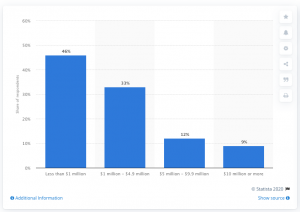Last updated 01-29-2020
By:
Natalya Bucuy
I’m a social Latin dancer.
What that means is that to satisfy my dance addiction improve my dance skills I travel to dance congresses a couple of times a year. Similarly to any business or hobby conferences, these events gather thousands of people from all over, usually in large urban hotel venues. We then take workshops, meet new people, party, eat, drink, and be merry.
A good story…
Last year I attended an event in Phoenix, Arizona that took place at a beautiful resort. Besides the fact that the venue was an amazing paradise with palm trees, pools, and gorgeous architecture, the hotel staff was friendly, helpful, and welcoming in every aspect.
Due to an error, the hotel system charged me additional fees. But once I emailed a manager he reversed them immediately. I didn’t want to leave the place at the end of my stay as it truly served as an amazing home away from home in addition to hosting a wonderful well-put-together event.
A different story…
A month later (did I mention I have an addiction?) I attended another dance conference. This time in New Jersey. The event offered similar workshops, the same caliber of nightly social dancing, and plenty of space to accommodate the large crowd of dance enthusiasts.
But things were off with the hotel. There was no one manning the only coffee shop located right next to the always-staffed reception desk (a devastating thing if you’ve danced until sunrise and are up at 10 am for daily workshop activities). The staff wasn’t that friendly, the onsite food wasn’t great, there were issues with reservations and check-ins. When a friend of mine got charged for two extra nights by mistake she faced a variety of roadblocks to fixing the error, with which she is still dealing now, four months later.
What is the difference between these two experiences I had? Care.
Care about retaining hotel guests…
The staff of the Arizona venue cared about their guests’ experiences. The staff in New Jersey didn’t.
Why?
The answer to that question could lie in the fact that the Arizonian event was in its second year at the venue and the resort was eager to prove itself to attendees.
After all, large meetings and events bring huge revenues to the venues that host them.
According to one statistic, 33 percent of venues that held large events in 2018 reported between $1 million and $4.9 million in revenue from just that one event.

Source: Statista
If a hotel secures a future event with the same organization, it gets large profits in repeated business.
The New Jersey venue has hosted the event since the conference’s initiation in 2011. Perhaps the hotel owners have taken the event and its guests for granted.
But there is more to this problem. If anyone asks me where to stay in Phoenix, Arizona I will recommend the venue (The Wigwam, if anyone wants to know). The New Jersey venue will not get my vote. Even if I decide to attend the next dance conference there next year (whom am I kidding I already bought my ticket) I will not stay at that hotel. I will look for a nearby alternative.
So herein lies the mistake of the second venue. The venue might retain the huge revenue-boosting event year after year because of convenience or familiarity factors on the organizers’ side. But it overlooks thousands of opportunities for potential repeat and even loyal customers.
It does not focus on retaining hotel guests outside of events. And in the world where reaching profitability goals is a major challenge for hoteliers everywhere, missing opportunities is not something they can afford.
How can venues work on retaining hotel guests post-events?
As we see in the examples above disappointing event attendees can cost hotels future business. Business that they cannot afford to lose.
The projected growth for meeting, convention, and event planners is expected to increase by 11% in the USA between 2016-2026, faster than average. (The Bureau of Labor Statistics, 2018)
So what can a hotelier do in terms of retaining guests and potentially turning them into loyal customers?
As we can see, once again, from my personal experience story above, a venue can’t make a customer come back, even if the venue hosts the same event the follower year. What hotels can do is make people want to stay there again.
How? Here are three steps to retaining hotel guests.
Step 1: Enhance Customer Experience
An event attendee is already a customer. So that’s the hotel’s chance to shine.
There are countless ways to show your customers you care (I assure you, having no one serving coffee to a tired dancer is not one of them). Here are some tips:
Provide a personalized experience.
Getting to know each guest before he or she arrives is not an easy task. However, it can boost the hotel guest satisfaction rate tremendously. Tactics such as a pre-stay survey about specific guest preferences or just some questions about each guest upon check-in can give the hotel staff some insight into guest preferences. Good reservations, relationship management, and service optimization systems can serve as great tools for providing a superior customer experience.
Embrace technology.
Unless a hotel is catering to a nostalgic retro-focused group of hipsters who would just die of happiness at a sight of a rotary phone (hey, you never know, it could be part of your personalization strategy!), using technology in the 21st century is essential. From omnichannel communications to check-in options to in-room smart tech – there is always something to help a hotel enhance the customer experience with the newest technology.
Nearly 80% of American consumers say that speed, convenience, knowledgeable help, and friendly service are the most important elements of positive customer experience. The same technology that enhances these experiences can be used to support and create meaningful connections between attendees. (CVent)
Train staff to deliver a welcoming atmosphere.
A hotel can have the best setting, the latest tech, and the cleanest facilities, but if the staff has a bad attitude retaining hotel guests after the event is going to be impossible. If a guest faces a grumpy employee at check-in, grouchy or intruding staff (don’t get me started on 8 am housekeeping knocks! I told you, I danced until sunrise!), or understaffed coffee shops (yes, I’m still mad!) nothing else will matter. Friendly, consistent, positive service is essential in the hospitality field.
Step 2: Build Authentic Connection
Mark Harmon, Founder at Auberge Resorts Collection, discusses “the soul of a hotel” in his Ted Talk. Hotel’s life beyond its physical walls, its harmony with the landscape, the soulfulness of service, and affection for its guests is what makes great venues stand out, he argues.
In other words, providing a seamless experience is important. But to stand out from the competition and achieve better rates for retaining hotel guests, venues have to build genuine connections with its guests.
There are some effective ways to do it:
Listen
Nothing says “care” as much as listening does. I felt that New Jersey venue knowing in my heart that no one at that hotel cared about any aspects of my stay. No one asked. No one followed-up.
What if someone asked – What went wrong? How did things go right? What can we do differently next time? Asking these questions during or after my stay at the venue could have made things go very differently. The coffee shop could have had a staff member the next day. My friend may have had an easier time getting her refund.
Tools that provide real-time feedback with options for follow up with the customer can be a great listening tool for retaining hotel guests before they even leave the property. Hotel guest feedback kiosks are a great option as they provide real-time results. They also offer quick and efficient solutions hoteliers can implement immediately to remedy problems.
Harmonize
Harmonizing with the hotel surroundings and with its guests can make a big difference in making connections with future customers. The concept goes hand in hand with the personalization of customer experience, but it extends beyond that.
Being a good host to guests means connecting them not only to the venue itself but also to the area. So encourage staff to serve as guides, not simply hosts.
Visitors are curious, it’s why they’ve visited a new town, city, or even country. In the hotel industry, we’ve long surpassed the point of offering guests a uniform, just-like-home experience. Today’s travelers expect more. They are fascinated by authentic, local experiences, and they expect your staff to know the best things to see and do. (RoomRanger)
Inspire
Travel is an interesting animal. Ever notice how going somewhere new brings travelers new ideas, encourages new projects and wakes up ambitions? Travel inspires.
As a destination for travel, hotels have a unique ability to serve as inspiration in themselves. Think about the kind of connection Ernest Hemingway had to his place in Key West, where he wrote his several novels. Imagine being the hotel where one of your guests gets the idea for his or her next groundbreaking project! That would create an unbeatable, unbreakable connection between the guest and the venue.

Ernest Hemingway’s House, Key West. Source: Andreas Lamecker
We can not predict what can inspire someone, but we can always try to be an inspiration.
Interior design magazine presents seven most inspiring hotels in the U.S. What do they have in common? They are all stunning visual and aesthetic examples of spaces that make visitors feel good.
Step 3: Provide Incentive to Come Back
Positive customer experience and personal connection between the customers and the brand can both serve as great ways of retaining hotel guests.
If a venue has done those two things the chances of a guest returning increase dramatically. But an incentive to return can also be helpful.
Here are some examples of effective incentives:
- Discounts effective between the current and the next event
- Multi-brand point systems
- VIP experiences or bundle deals if guests book next event stay in advance
Another great way to acquire additional business is to offer your guests to write online reviews for your hotel or to send referrals to their friends and family in exchange for additional incentives and discounts. Some feedback kiosks provide such options to responders, also providing the venue data for guest post-stay follow up.
Bottom Line
Large hotels with enough space to accommodate conferences, festivals, congresses, and meetings have an amazing opportunity to host thousands of attendees. Such events bring large revenues and secure repeated business should the event take place again.
However, event attendees matter, too. Retaining hotel guests after the event, either for another stay during the next event or for a visit in-between events is a unique opportunity hoteliers cannot afford to miss.
At 59% feedback survey is the most favored method for measuring the success of a live event experience. Meanwhile, 55% of event professionals ranked feedback from client or management as their second most favored method for measuring live event success. (EventMB, 2019).
By providing superior customer experience, connecting with the guests, and providing them with incentives to come back, hotels increase their chances of gaining future loyal customers.

